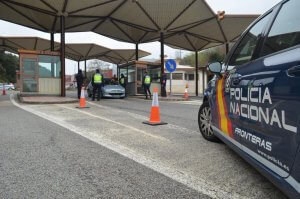Latest: Coronavirus in Spain full update (23 May)
Please support Spain in English with a donation.
Report below updated in Spain at 13h on Wednesday 13 May
CORONAVIRUS in SPAIN – today’s figures
The latest official figures* for Coronavirus (Covid-19) released by Spain’s Health Ministry in Madrid at 12 noon on Wednesday 13 May confirm that 27,104 people have now died from the pandemic in Spain, up by 184 on yesterday.
Tuesday had seen an increase of 176 Coronavirus-related deaths over Monday. Monday had been an increase of 123 over Sunday – the lowest figure since 18 March. Sunday had been 143.
The current peak of recorded deaths related to Coronavirus in a 24-hour period in Spain was on 2 April, when 950 deaths were registered.
Official figures released daily by the Spanish Health Ministry are for the total number of people who have tested positive for Coronavirus only through a PCR test (polymerase chain reaction). That figure for Wednesday 13 May is 228,691 – an increase of 439 over yesterday.
Tuesday’s figure for the increase of infections tested only through PCR had been 426 over Monday Monday’s comparative figure had been 373 over Sunday. Sunday had been 621.
A total figure also released today by the ministry for those who have tested positive through PCR and antibody testing, however, is 271,095 (228,691 PCR; 42,404 antibody).
The current peak of recorded infections for a 24-hour period in Spain was on 31 March, when 9,222 new cases were registered (including from PCR and antibody).
140,823 people have now made a full recovery.
With regards the official figures released by the central Health Ministry for each region of Spain, there have been discrepancies in the data released independently by some of those regions, particularly for Madrid and Catalonia. Please refer to *Health Ministry data and regional discrepancies below.
Of the official figures released by the ministry today – and based only on the total 228,691 confirmed cases through PCR testing – there have now been 65,269 cases in the Madrid region and where 8,760 have died (from the total 27,104 across the country). There have been 55,280 cases in Catalonia and where 5,692 have died.
There are now 13,214 known cases in the Basque Country (1,442 deaths), 12,317 in Andalusia (1,332), 16,453 in Castilla La Mancha (2,835) and 10,760 in the Valencia region (1,341).
Figures for those infected with Coronavirus in other regions are now as follows: Aragón 5,372 (829 deaths), Asturias 2,356 (307 deaths), Balearic Islands 1,957 (215), Canary Islands 2,271 (151), Cantabria 2,256 (205), Castilla y León 18,105 (1,919), Ceuta 114 (4), Extremadura 2,919 (489), Galicia 9,301 (597), Melilla 119 (2), Murcia 1,525 (142), Navarra 5,094 (494) and La Rioja 4,009 (348).
A full breakdown in Spanish of the data per region, together with age group statistics can be found by clicking here. Please also see Health Ministry data and discrepancies below.
ALSO READ: Lifting of lockdown in Spain – full details of all phases & regions
Sign up for our FREE Weekly Newsletter

CORONAVIRUS in SPAIN – latest updates
Barcelona to move to Phase One from Monday 18 May?
The Catalan government and the Barcelona City Council are meeting today (Wednesday) to assess whether to propose to the Spanish Health Ministry that Barcelona is now in a position to move to Phase One of the lockdown de-escalation plan.
Alba Vergés, in charge of the Catalan regional government’s health department, explained that a ‘joint office’ has been created with Barcelona City Council to address the issue. ‘We will make an assessment together to see how we believe the city is,’ she said. That meeting will take place today.
Figures released today (as above) show that Catalonia has registered a total of 55,280 cases of Coronavirus (tested via PCR) – an increase of 136 cases in the past 24 hours.
On Monday around 51% of the Spanish population moved to Phase One of the government’s four-phase plan to lift lockdown restrictions.
We have published all the key rules and measures regarding the four phases in a separate report, together with the current ‘phase status’ for each region and province. It is regularly updated as and when new measures are announced. The report can be found here: Lifting of lockdown in Spain – full details of all phases for all regions.
Three low-risk ‘healthcare zones’ in Catalonia – the Tarragona area (known as Camp de Tarragona), the Ebre region (Terres de l’Ebre) and the western Pyrenees (known as Alt Pirineu i Aran) – all moved to Phase One on Monday 11 May.
The rest of Catalonia (including the cities of Barcelona, Girona and Lleida) remained in Phase Zero.
Girona, central Catalonia, Lleida, and the north and south Barcelona metropolitan areas were said to have a ‘moderate risk’, whilst the city of Barcelona itself was judged to have a ‘moderate-high risk’.
Alba Vergés has said that whilst the evolution of the pandemic in Barcelona is ‘good’ in terms of health, there are other criteria to consider, such as mobility.
This Friday, Spanish Health Minister Salvador Illa is expected to announce other areas of the country that are now able to move to Phase One, and which would officially take place from Monday 18 May.
Meanwhile in Madrid, the vice-president of the regional government, Ignacio Aguado, has insisted on Wednesday that the city and region need to move swiftly to Phase One – yet ‘safely’ and also to ‘regenerate wealth and employment’.
Figures released today (as above) show that Madrid has registered a total of 65,269 cases of Coronavirus (tested via PCR) – an increase of 75 cases in the past 24 hours.
It has also been reported that the entire regions of Valencia, Andalusia and Castilla La Mancha could now be in a position to move to Phase One from Monday 18 May.
Click here for our full report on the de-escalation of the lockdown that includes the current phase status for each region and province across Spain.
Spain’s eldest citizen survives Covid-19
Maria Branyas, who at 113 is Spain’s most senior citizen, has overcome Covid-19 having experienced only ‘mild’ symptoms. She is possibly the world’s oldest person to survive the disease.
Born on 4 April 1907 to a Catalan family in San Francisco, California, Branyas moved to Spain as a young child and has memories dating far back to World War I as well as the Spanish Civil War.
In her 113 years Maria Branyas has insisted that through civil and world wars, pandemics and more than a century of phenomenal change she “has done nothing more than live” https://t.co/NHGc85vbQn
— The Times (@thetimes) May 13, 2020
At the Santa Maria del Tura care home where she is residing, located in Olot, northern Catalonia, there had been 17 Coronavirus-related deaths reported on 1 April – and so only one healthcare worker has since been allowed to enter Branyas’ room for the duration of the crisis. In mid-April Branyas herself was diagnosed following a PCR test.
Officials, family members and workers at the care home where she has lived for the past 20 years have confirmed that Branyas has now recovered from the diseases and that she is now doing well, as well as ‘calm and optimistic’.
Branyas received a great deal of media attention over of a month ago on her 113th birthday. Her daughter says that she downplays the importance of her age and claims the only secret to her longevity is ‘being healthy’ throughout most of her life.
Branyas has raised three children – one of whom recently turned 86 – has 11 grandchildren – the oldest of whom is 60 – and 13 great-grandchildren.

Spain orders 14-day quarantine for international arrivals
International travellers arriving to Spain will have to self-quarantine for 14 days, according to a new order published on Tuesday in the Boletín Oficial del Estado (BOE) by the Spanish Interior Ministry.
The order comes into effect this Friday 15 May and is to remain in place during of the ‘state of alarm’. This is currently due to end on 24 May, but could be extended again. If so, the quarantine restrictions would also continue.
During 14 days, international travellers arriving in Spain will have to stay at home or wherever they are due to lodge, and their movements will be limited to basic activities only, such as buying necessary products, for health reasons, or force majeure.
Those crossing the border into Spain will also be obliged to wear a face mask and comply with all hygiene and safety measures.
Cross-border workers, freight drivers, cargo workers, transport crew, diplomatic staff and health workers are to be excluded from this rule, as long as they have not been in contact with anyone diagnosed with Coronavirus.
These restrictions come on top of those previously adopted at land borders with France and Portugal and the restrictions on the entry of travellers at external borders (originating in countries from outside the Schengen area) at ports and airports.
The Boletín Oficial del Estado (BOE) states that from midnight on 15 May, only the following may come into ‘national territory at internal borders through ports and airports’:
- Spanish citizens.
- Residents in Spain, accrediting their primary residence.
- Cross-border workers.
- Healthcare professionals or those who look after the elderly to exercise their labour activity.
- Those people who can show documentary evidence of causes of force majeure or a situation of need.
Foreigners duly accredited as members of a diplomatic mission or those who come to Spain on ‘exclusively work-related grounds, provided that they can show documentary evidence’, may also gain access through these borders.

Furthermore, it states, in order to ensure the continuity of economic activity and to preserve the supply chain, these measures will not apply to ‘the transport of goods, including the crew of maritime vessels, in order to guarantee the provision of maritime transport services and fishing activity, and the aircraft personnel necessary to carry out commercial air transport activities’.
When the Spanish Congress recently voted to officially extend the current ‘state of alarm’ lockdown until 24 May, it was the fourth time that it had been extended, having originally started on 14 March. The lockdown is in place as Spain also continues with the four phase de-escalation plan of gradually lifting restrictions, depending on the progress of each region and province.
Last Thursday, however, Spain’s first deputy prime minister Carmen Calvo said in an interview that it was almost certain that Spain would still need ‘some more weeks’ of lockdown even further than 24 May.
It has been reported in the Spanish media on Wednesday that when Spanish Prime Minister Pedro Sánchez next seeks to extend an extension to the lockdown, he will be doing so for a month – until late June – and not for just two weeks.
Sign up for the FREE Weekly Newsletter
Please support Spain in English
*Health Ministry data
From 24 April, Spain’s Health Ministry changed its criteria for Coronavirus statistics. The official daily figure for the number of infections is now for those tested only via PCR (polymerase chain reaction).
All regions of Spain must now also report deaths and intensive care unit (ICU) admissions in the same way. A victim can only be counted in the death tally if they have tested positive for Covid-19 via a PCR or rapid test.
Health Minister Salvador Illa said, ‘Spain is following a very strict definition of cases in line with international authorities, including the World Health Organization (WHO) and the EU Centre for Disease Prevention and Control (ECDC). Anyone who tests positive for Covid-19 and then dies is considered a Coronavirus fatality’.
Sign up for our FREE Weekly Newsletter
Please click to support Spain in English
Up-to-date WHO advice and facts (in English) about the Coronavirus epidemic can be found here: www.who.int/emergencies/diseases/novel-coronavirus-2019/technical-guidance.
Our previous reports on Coronavirus in Spain:
ALSO READ: Ryanair plans to restore 40% of flights from 1 July
ALSO READ: Coronavirus in Spain full update (12 May)
ALSO READ: Coronavirus in Spain full update (11 May)
ALSO READ: La Liga players back in training, with games to possibly restart on 20 June
ALSO READ: Coronavirus in Spain full update (10 May)
ALSO READ: Coronavirus in Spain full update (9 May)
ALSO READ: Opinion: It’s common sense … isn’t it?
ALSO READ: Children enjoy first ‘hour of freedom’ in 43 days
ALSO READ: Opinion: why bullfights should stay cancelled after Covid-19
ALSO READ: Pedro Sánchez seeks cross-party ‘Moncloa Pact’ for recovery programme
ALSO READ: Co-Vida: an inspiring community action project
ALSO READ: One day more, one day less
ALSO READ: ‘Up on the Roof’ – surviving lockdown from above
ALSO READ: Open Arms refugee NGO helping to combat Coronavirus
ALSO READ: Coronavirus in Spain: unemployment figures worst on record
ALSO READ: FC Barcelona players agree to 70% pay cut, and will ensure staff receive 100%
ALSO READ: Animal rights NGO starts petition against possible state aid for cancelled bullfights
ALSO READ: Spain publishes list of hotels that will remain open
ALSO READ: The new restrictions at Spain’s airports, ports and land borders
ALSO READ: Walking a goat or a Vietnamese pig is not allowed
ALSO READ: Coronavirus in Spain – full advice for British travellers seeking to return to the UK
ALSO READ: Despite lockdown, Spaniards applaud health workers from balconies every evening
Sign up for the FREE Weekly Newsletter from Spain in English



1 comment
Who gets up at 6 in the morning? Ridiculas hour. I personally wont be exercising at such an ungodly hour.